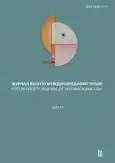Ukraine v. Russia: a Commentary on the Order of 16 March 2022 on the Request for the Indication of Provisional Measures
- Авторлар: Pimenova S.D.1
-
Мекемелер:
- Lomonosov Moscow State University
- Шығарылым: Том 1, № 1 (2023)
- Беттер: 97-103
- Бөлім: Commentary
- URL: https://journal-vniispk.ru/2949-5717/article/view/319965
- DOI: https://doi.org/10.17323/jil.2023.17451
- ID: 319965
Дәйексөз келтіру
Толық мәтін
Аннотация
Авторлар туралы
Sofia Pimenova
Lomonosov Moscow State University
Email: sofia.pimenova@inbox.ru
Candidate of Sciences in Law, Assistant of International Law Department, Faculty of Law, Lomonosov Moscow State University, Moscow, Russia
Әдебиет тізімі
- Fontanelli F. (2021) Once Burned, Twice Shy. The Use of Compromissory Clauses before the International Court of Justice and Their Declining Popularity in New Treaties. Rivista di diritto internazionale, vol. 104, no. 1, pp. 7–39.
- Kadysheva O. (2022) Neizvestnaya “sanktsionnaya voyna” i vozmozhnosti mezhdunarodnogo pravosudiya [Unknown “sanctions war” and the possibilities of international justice]. Mezhdunarodnoe pravosudie, vol. 12, no. 4, pp. 91–107. (In Russian).
- Kulick A. (2022) Provisional Measures after Ukraine v Russia. Journal of International Dispute Settlement, vol. 13, pp. 323–340.https://doi.org/10.1093/jnlids/idac012
- Ohlin J. D. (2022) #Genocide: Atrocity as Pretext and Disinformation. Virginia Journal of International Law, vol. 63, no. 101, pp. 101–164.http://doi.org/10.2139/ssrn.4218005 doi: 10.2139/ssrn.4218005
- Rieter E. (2021) Autonomy of Provisional Measures. In: Provisional Measures Issued by International Courts and Tribunals. In: Palombino F. M., Virzo R., Zarra G. (eds.) Provisional Measures Issued by International Courts and Tribunals. The Hague: T.M.C. Asser Press, pp. 55–76.http://doi.org/10.1007/978-94-6265-411-2_4 doi: 10.1007/978-94-6265-411-2_4
- Sanger A. (2022) False Claims of Genocide Have Real Effects: ICJ Indicates Provisional Measures in Ukraine’s Proceedings Against Russia. The Cambridge Law Journal, vol. 81, part 2, pp. 217–221.http://doi.org/10.1017/S0008197322000265 doi: 10.1017/S0008197322000265
- Treves T. (2021) Litigating global crises. Setting the scene: Legal and political hurdles for State-to-State disputes. Questions of International Law: Zoom-out, vol. 85, pp. 5–15.
Қосымша файлдар








